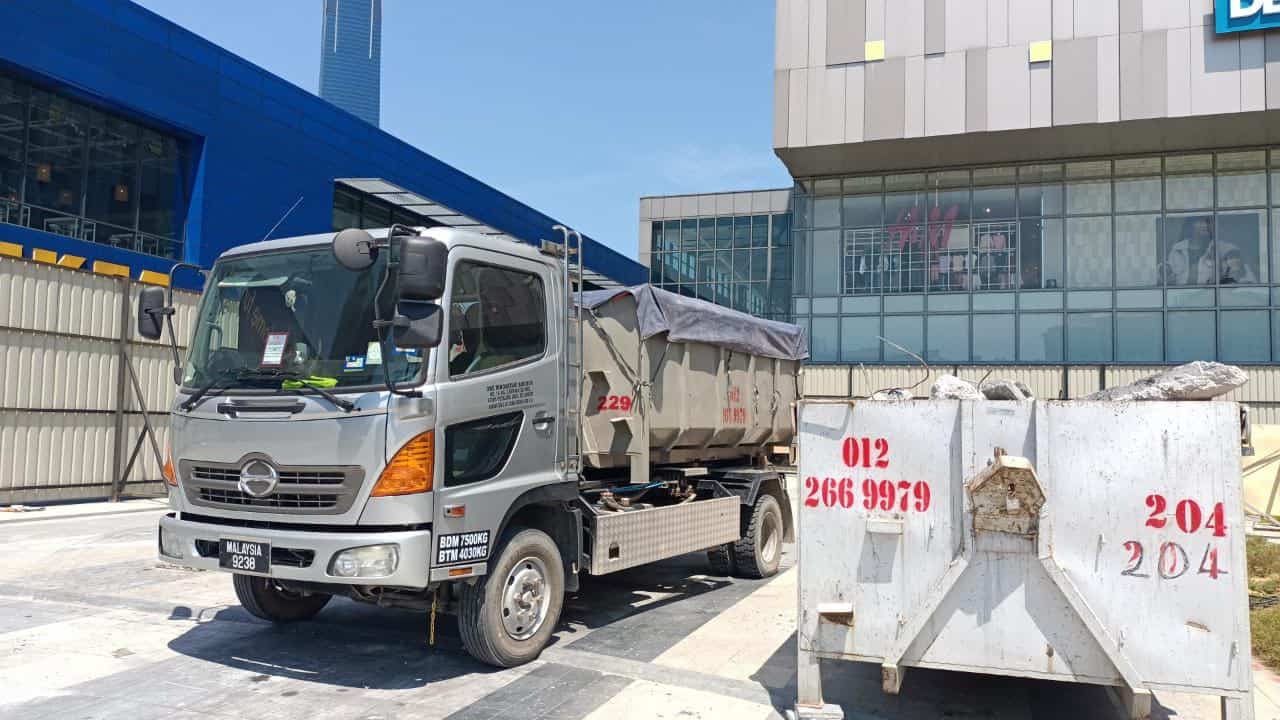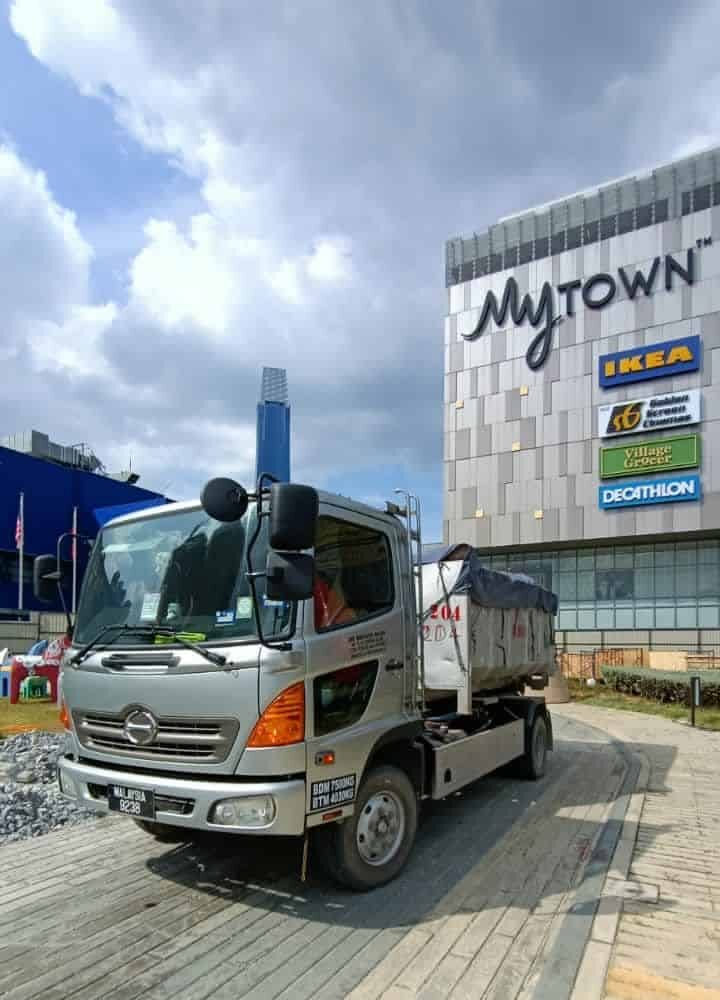RORO BIN RENTAL
Find The Right Size For Your Project

Small Roro Bin
Dimensions: 12′ (L) X 6′ (W) X 2.5′ (H)
Best Use: Heavy construction and demolition waste like concrete and soil.

Large Roro Bin
Dimensions: 12′ (L) X 6′ (W) X 4′ (H)
Best Use: Light-weight construction, industrial, commercial waste, furniture, household bulky waste, trees and etc.

Domestic Roro Bin
Dimensions: 12′ (L) X 6′ (W) X 4′ (H) with roof
Best Use: Domestic food waste (Organic waste).

Extra Giant Roro Bin
Dimensions: 16′ (L) X 8′ (W) X 6′ (H)
Best Use: Light-weight construction, industrial, commercial waste, furniture, household bulky waste, trees and etc.

Giant Roro Bin
Dimensions: 14′ (L) X 7′ (W) X 5.5′ (H)
Best Use: Light-weight construction, industrial, commercial waste, furniture, household bulky waste, trees and etc.
WHAT MAKES US DIFFERENT ?

Value Price

Express Service

Licensed Under Local Authorities

Quick Scheduling
TESTIMONIALS
OUR CLIENTS







PROJECT REFERENCE









Construction Site Trash Bins Rental
Introduction to Construction Site Waste Management
Managing waste on a construction site isn’t just about keeping things tidy—it’s essential for ensuring a safe, efficient, and eco-friendly project. Construction sites produce a wide range of waste, from wood and metal to concrete and sometimes even hazardous materials. But where does all of it go, and how can you make sure it’s disposed of correctly?
Why Waste Management is Essential on Construction Sites
Construction waste can quickly pile up, posing risks to workers and even slowing down the progress of a project. By having a proper waste management system, teams can focus on building while ensuring that waste is disposed of safely and efficiently.
Key Challenges of Waste Disposal in Construction Projects
Construction sites face unique challenges in managing waste, such as finding space for bins, sorting various waste types, and dealing with hazardous materials. Without effective waste management, these challenges can turn into costly delays and safety hazards.
What Are Construction Site Trash Bins?
Construction trash bins, or dumpsters, are large, heavy-duty containers specifically designed to hold a significant amount of construction waste. These bins are available in various sizes and types, each catering to specific needs based on the type and amount of waste your project generates.
Types of Trash Bins Available for Construction Sites
Roll-Off Dumpsters
Roll-off dumpsters are rectangular bins with wheels that make them easy to roll off the truck and place on the ground. They’re typically used for larger construction projects and can hold a wide range of materials, from metal to drywall.
Front-Load Dumpsters
Front-load dumpsters are smaller than roll-off types and are better suited for projects that generate less waste. They’re often used for daily or weekly pickups, making them ideal for long-term or smaller construction projects.
Specialty Bins for Hazardous Materials
For projects that deal with hazardous waste like asbestos or certain chemicals, specialty bins are essential. These bins are designed to safely contain harmful substances and comply with strict disposal regulations.
Choosing the Right Size for Your Project Needs
Selecting the right size is crucial for efficient waste management. Too small, and you’ll face frequent pickups; too large, and you’re paying for unused space. Consider the type and amount of waste your project will produce and consult with a rental service to make the best choice.
Benefits of Renting Trash Bins for Construction Sites
Renting a trash bin offers numerous advantages for construction projects. Here’s a closer look at how it can make a difference.
Cost-Effective Solution
Buying a dumpster outright isn’t cost-effective for temporary needs, while renting offers flexibility and a lower price tag, making it a smart option for short-term projects.
Helps Maintain a Clean and Safe Site
A clutter-free site reduces hazards and helps workers move more efficiently. With designated waste bins, you’re promoting a cleaner and safer work environment.
Reduces Environmental Impact
Most rental services offer sorting and recycling options, meaning your waste is handled in an eco-friendly way, reducing landfill contribution and environmental impact.
Streamlined Waste Disposal Process
By having a rental service handle disposal, you save time and effort, allowing your team to focus on the project itself instead of waste management.
How to Choose the Right Trash Bin Rental Service
When selecting a rental service, there are several factors to keep in mind to ensure you’re getting the best deal and support.
Assessing the Needs of Your Project
Consider the type, size, and duration of your project to determine your waste management needs. This helps you choose the right bin size, pickup frequency, and any special disposal options.
Understanding the Rental Contract Terms
Carefully read the rental contract. Look for details on fees, disposal limits, and pickup schedules, so you aren’t caught off guard by unexpected charges or requirements.
Customer Support and Service Availability
Reliable customer support is a must. Make sure your rental service is responsive and available if any issues arise during the rental period.
Step-by-Step Guide to Renting Construction Trash Bins
Renting a trash bin doesn’t have to be complicated. Follow these steps to ensure a smooth rental experience.
Step 1: Identify Waste Type and Quantity
Estimate the types and amounts of waste your project will generate. This helps in choosing the correct bin size and type.
Step 2: Select Bin Size and Type
Based on your project’s waste, select a bin that matches your needs. Consult the rental service if you’re unsure of the size.
Step 3: Schedule Delivery and Pickup Dates
Plan out your project timeline and set delivery and pickup dates that align with it, ensuring uninterrupted waste management.
Step 4: Understand Disposal Policies and Restrictions
Rental services often have specific policies for certain waste types, so be aware of any restrictions before discarding materials.
Factors Affecting the Cost of Trash Bin Rentals
Several elements can influence the rental cost, so it’s important to know these factors before renting.
Bin Size and Rental Duration
Larger bins and longer rental periods typically increase the cost. Determine the most efficient size and rental term for your budget.
Type of Waste Being Disposed
Hazardous or bulky waste may incur extra fees, as it requires special handling.
Location and Accessibility of the Site
Sites that are hard to access or far from the rental service might also result in higher fees due to transportation costs.
Common Mistakes to Avoid When Renting Trash Bins
Knowing what to avoid can save you time, money, and hassle. Here are some common pitfalls.
Underestimating the Amount of Waste
Underestimating waste volume can lead to overflow and increased pickup fees. Always round up to ensure you have enough space.
Ignoring Hazardous Waste Disposal Rules
Throwing hazardous materials in regular bins can lead to fines and safety risks. Always use specialty bins for such items.
Overlooking the Importance of Rental Contracts
Rental agreements have vital information about charges, restrictions, and schedules. Don’t skip over this step, or you may encounter unexpected issues.
Eco-Friendly Disposal Options for Construction Waste
Sustainable waste management is increasingly important in construction.
Recycling and Reusing Construction Materials
Reusing materials like concrete, metal, and wood helps reduce waste and often saves money on new materials.
Partnering with Green Waste Disposal Services
Some rental companies specialize in eco-friendly disposal, so look for services that prioritize sustainability.
Reducing Waste with Efficient Project Planning
Smart planning can help reduce waste generation, resulting in fewer trips to the landfill and lower disposal costs.
Safety Considerations with Trash Bin Rentals
A safe site is a productive one. Proper placement, adherence to disposal policies, and regular monitoring contribute to a safer work environment.
Proper Bin Placement and Access
Place bins in accessible but out-of-the-way areas to prevent obstruction and enhance safety.
Ensuring Only Approved Waste is Disposed
Dispose only of permitted items to avoid safety risks and potential fines for improper disposal.
Regular Monitoring and Maintenance of Trash Bins
Check bins regularly for overflow or damage, and ensure proper waste is being disposed of in each bin.
Renting trash bins for a construction site offers a practical, cost-effective way to manage waste while keeping the site clean and safe. By choosing the right type and size of bin, understanding the rental terms, and taking steps toward eco-friendly disposal, construction projects can run smoothly without the burden of waste management.


